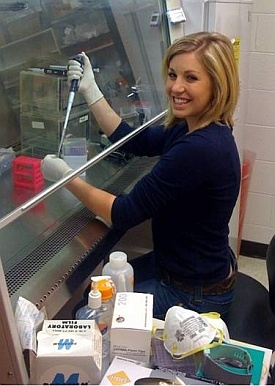Jun 10 2009
Colorado State University scientists this month received a $2.7 million National Science Foundation grant to train graduate students on cutting-edge research while also preparing them to share their knowledge with K-12 teachers and industry.

The grant will help the U.S. stay competitive globally by boosting shrinking science and engineering enrollments and giving emerging scientists more tools to work within their communities, the scientists said.
How cells behave
On the scientific side of the grant, graduate students will test new theories about how cells behave using advanced engineering methods in microelectronics and electrochemistry - research led by Colorado State engineering professor Tom Chen, who is the grant's principal investigator, and co-principal investigator Stuart Tobet, a biomedical sciences professor in the College of Veterinary Medicine and Biomedical Sciences.
Michael A. De Miranda, an engineering education professor in the College of Applied Human Sciences and another co-principal investigator of the grant, will work with students on the next step: Taking what they've learned and sharing it with K-12 teachers across the region. Participating are the Poudre, Thompson Valley, Greeley and Weld RE-9 school districts in Northern Colorado.
Promote careers in science, technology, engineering and math
The grant, with a goal to infuse K-12 students with excitement for careers in science, technology, engineering, and mathematics, comes at an opportune time - when fewer students are pursuing STEM careers.
According to the Board of Engineering Education-National Research Council, the nation faces a declining number of engineering graduates - the annual graduation rate in engineering has decreased by roughly 20 percent in the last decade - while the number of engineering jobs is expected to grow 25 to 30 percent by the end of the century.
"We're all recognizing the fact that 21st century science requires interdisciplinary collaboration," Tobet said. "The CSU environment helps promote that collaboration."
Biosensors track cell movement
Tobet's research focuses on how the brain develops - how cells define a growing and maturing brain. Chen's research focuses on developing nanosystems in electrical engineering. Biosensors created by Chen and his students will help "track" cell movement for Tobet who studies cell movements in the brain, ovaries and pituitary glands.
Using electrochemistry as a detection method, cells are spread over a layer of electrodes that are one to two microns wide - about one one-hundredths of the diameter of a human hair. These studies are also strongly supported by Professor Chuck Henry from the Department of Chemistry who has significant expertise in the area of electrochemistry.
Predict epileptic attacks?
"There's a region of the brain where we can look at particular chemical communications between cells," Tobet said. "We don't know what happens as those chemicals known as neurotransmitters are released - where do they go and how do they get used or absorbed?
The team will also be able to utilize mathematical modeling to help understand the complexities of the biological process with the support of Professor Vakhtang Putkaradze from the Department of Mathematics."
Ultimately, biosensors could help predict when patients will experience an epileptic attack or chronic pain, Tobet said.
Train scientists in a new way
"The problems we're trying to solve require a very broad range of expertise," Chen said. "We can have a wide impact. The overall goal of the proposal is to train scientists in a new way."
The grant is intended to take that impact beyond the higher education classroom into the community to be shared with K-12 teachers and industry leaders, said De Miranda.